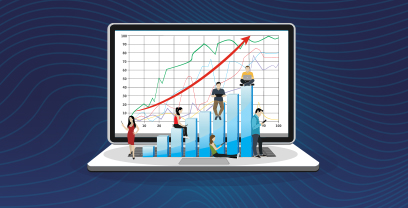In an era where economic volatility, geopolitical unrest, and environmental concerns are reshaping the business landscape, procurement has emerged as a vital strategic function. Amidst these challenges, departments are increasingly prioritizing performance enhancement through digital transformation, strategic sourcing, and an amplified focus on corporate social responsibility (CSR).
The drive for transparency and compliance necessitates the rapid adoption of digital solutions, as organizations set ambitious targets for 2027 to elevate procurement efficacy, ensure scalability, and foster impactful business results. As digital solutions become entrenched in procurement processes, a survey conducted globally uncovers a trend towards an upsurge in digitalization within procurement operations. However, the question arises whether businesses are maintaining the pace required for this digital shift.
Our latest blog and webinar recap explores the survey results to discern the strategic imperatives and technological trends that are shaping the future of procurement.
Embracing the Digital Shift: A Strategic Approach to Procurement
In the face of economic, geopolitical, and environmental crises, the strategic importance of procurement has been amplified. Departments are now focusing more on enhancing their performance through digital transformation, strategic sourcing, and corporate social responsibility (CSR).
The escalating need for transparency and compliance has contributed to the accelerated adoption of digital solutions, with organizations diligently working on their digital roadmaps. Ambitious digitalization targets set for the year 2027 aim to improve procurement performance, ensure scalability, and drive business outcomes.
The PwC global survey indicates a rise in digitalization within procurement, yet it is critical to assess whether businesses are keeping pace with this trend. As digital solutions become increasingly ingrained in procurement functions, the standard for transparency and compliance also rises.
These solutions are becoming a necessity, with the majority of companies having implemented source-to-pay or purchase-to-pay solutions, or both. It is essential for businesses to adopt a strategic approach when considering investments in digital procurement tools and to focus on achieving the full potential of these investments.
Key Insights from PwC’s Global Digital Procurement Survey
The PwC Global Digital Procurement Survey, a biennially conducted research, garners insights from senior procurement professionals across more than 58 countries, representing a diverse range of industries. The comprehensive survey report provides industry-specific KPIs and data, reflecting the strategic priorities and investment trends within the procurement landscape.
The survey reveals a notable rise in digital transformation, with organizations setting ambitious digitalization targets for 2027 aimed at enhancing procurement performance, scalability, and business results.
The adoption of digital solutions is accelerated by an imperative for transparency and compliance, a response to the evolving economic, geopolitical, and environmental challenges faced by procurement departments.
The findings indicate that digitalization is crucial for maintaining strategic focus on performance, strategic sourcing, and corporate social responsibility (CSR). Furthermore, the survey highlights the increasing commitment towards CSR, ranking third in terms of priorities.
The trend towards digital solutions is evident, with a majority of companies now having either Source-to-Pay, Source-to-Contract, or Purchase-to-Pay solutions, becoming the new norm. Despite high ambitions in digital investments, the actual rate of digitalization has not fully met expectations, although there is optimism that future targets will be achieved. Large companies have stabilized their investments, while small and medium-sized companies continue to ramp up their digital initiatives.
As procurement departments navigate their digital transformation journeys, the survey underscores the importance of simplifying and standardizing processes prior to digitalization, to facilitate easier implementation and subsequent automation.
The Evolution of Digital Procurement: Current Trends and Priorities
The realm of digital procurement is experiencing a notable shift, with departments emphasizing performance, digital transformation, and corporate social responsibility (CSR) as their top concerns.
The push towards digital transformation is not only fueled by the aspiration for process optimization but also by the necessity for compliance with new regulations. As a result, the adoption of digital solutions is accelerating at a swift pace, with organizations keenly mapping out their digitalization strategies for the near future.
Ambitious targets have been established for 2027, aiming to enhance procurement performance and ensure scalability to drive business outcomes. Source-to-pay solutions are emerging as the new standard, with businesses focusing on various business criteria to inform their decisions. A global survey by PwC indicates a rise in digitalization across procurement functions.
However, there remains a question of whether all businesses are sufficiently aligned with this trajectory. This overview reflects a snapshot of the current state of digital procurement, where the pursuit of performance, transformation, and sustainability takes center stage.
Source: PwC Global Digital Procurement Survey
The Future of Procurement: Digital Procurement by 2027
As the world moves towards 2027, digital procurement is poised at a transformative juncture. The roadmap for digital procurement is being redrawn, with high digitalization targets set to enhance performance and scalability. Companies, irrespective of size, are gearing towards a future where digital procurement is not just an option but a necessity for strategic growth and operational efficiency.
Investments in digital procurement, while stabilizing for larger corporations, are witnessing an upward trend among smaller entities, signaling a shift in market dynamics. The focus is intensifying on key areas such as data management, digitalization, risk management, and contract lifecycle management. These domains are crucial for the creation of a procurement ecosystem that is not only digitally proficient but also resilient and adaptable to the ever-evolving business landscape.
As organizations endeavor to align with these digital targets, it is clear that the procurement function is on the brink of a major overhaul, one that promises to redefine its role within the business framework and beyond.
Shifting Focus: Cost Control and Emerging Priorities in Procurement
As procurement continues to evolve in a rapidly changing economic landscape, certain strategic priorities come to the forefront. Cost control is upheld as a primary concern within procurement departments, highlighting the unchanging necessity to manage and optimize expenses.
However, what’s notable is the burgeoning significance of corporate social responsibility (CSR), which now garners increasing attention and importance within procurement strategies.
Despite the historical emphasis on risk and crisis management, there appears to be a decreased prioritization in these areas. Instead, a new and compelling area of focus surfaces—regulatory compliance.
Source: PwC Global Digital Procurement Survey
This shift signifies a response to evolving regulations and the need for stringent adherence to these new standards. Key statistics from the recent survey underscore the movement towards regulatory compliance, with a significant percentage of respondents identifying it as a critical area of attention.
The implications of these changes are profound, indicating a reorientation of procurement functions towards not only cost efficiency but also social accountability and regulatory alignment.
The survey results reveal a strategic recalibration where procurement performance, cost control, digital transformation, and strategic sourcing remain vital, yet are now joined by CSR and regulatory compliance as pivotal elements of procurement’s strategic framework.
Embracing Digital Solutions in Procurement: A Reality Check
In the procurement landscape, the integration of digital solutions has become increasingly common, with most companies having adopted source-to-pay or purchase-to-pay solutions. This shift from in-house to market solutions is clearly noticeable, indicating a trend towards external, specialized platforms for procurement tasks. Despite the widespread implementation of these digital tools, satisfaction levels do not align with their adoption rates.
Only 20% of companies express full satisfaction with the benefits realized from their digital solutions, suggesting a gap between expectations and outcomes. This underlines the critical importance of carefully assessing and choosing digital procurement solutions to ensure they meet organizational needs and are effectively adopted by users.
Navigating the Digitalization Wave in Procurement
The digitalization of procurement processes is experiencing a profound transformation, driven primarily by efficiency, simplicity, and process transparency. Organizations are increasingly adopting digital solutions to enhance their procurement performance and scalability, aiming for ambitious digitalization targets by 2027.
However, despite the widespread implementation of digital technologies, fewer respondents have reported tangible benefits in efficiency and procurement savings.
Compliance and regulatory transparency are the areas where an increase in perceived benefits has been noted. While there is a significant push towards digitalization, the realization of its potential benefits does not always align with expectations. This discrepancy indicates that while many companies are on the path to digital transformation, the journey is not without its challenges.
The survey reveals that only a minority of companies are fully satisfied with the realized benefits of their digitalization efforts, highlighting the need for a more strategic and thorough approach to digital adoption in procurement functions.
The Crucial Role of ESG in Modern Business Strategy
Environmental, Social, and Governance (ESG) considerations are increasingly becoming a cornerstone of business strategy. In the realm of procurement, ESG, especially environmental risk management, has emerged as a pivotal concern.
The drive toward integrating ESG into business operations is not solely a matter of corporate conscience but is also investor-driven, with a consensus that ESG factors should be woven into the fabric of business strategy.
This shift is underscored by the growing number of companies that are either currently utilizing or testing CO2 emission monitoring solutions. The statistics reflect a substantial uptick in the deployment of such solutions, indicating a heightened awareness and proactive stance towards managing environmental impacts.
As companies navigate their strategic paths, the integration of ESG considerations into their long-term plans is not just an ethical imperative but also a strategic one, aligning with investor expectations and paving the way for more sustainable business practices.
Conclusion: A Shift Toward Procurement Digitization
The global Digital Procurement Survey reveals a significant shift towards digitalization within procurement functions. It is observed that while the integration of digital solutions is on the rise, the satisfaction with the realized benefits remains low, with only a minority of companies fully content with the outcomes. The importance of simplifying and standardizing processes before undertaking digitalization is emphasized, as it leads to easier implementation and better automation potential.
Source: PwC Global Digital Procurement Survey
Additionally, a growing focus on corporate social responsibility and regulatory compliance is noted, reflecting the evolving priorities in procurement strategy. The survey also highlights a marked interest in contract lifecycle management and an increase in investments in environmental risk management tools, signifying the rising prominence of ESG considerations in procurement decisions.
Overall, the findings underscore the urgency for organizations to strategically embrace digital transformation to enhance procurement performance, scalability, and compliance.
Check our webinar replay here and the PwC Global Digital Procurement Survey.




